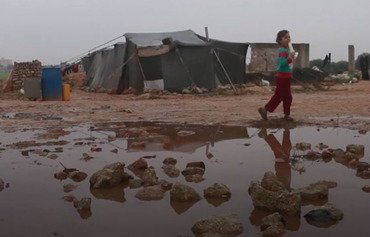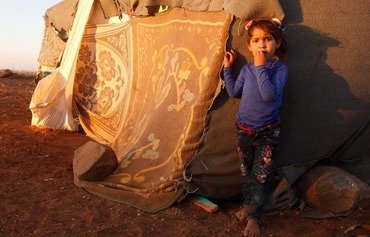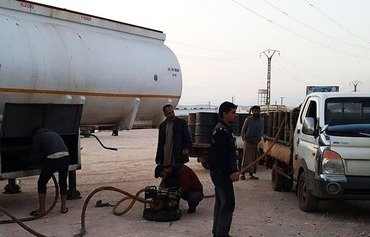The humanitarian situation inside northern Idlib province displacement camps near the border with Turkey is set to worsen, a local activist said, with the withdrawal of a charity that had been providing them with water services.
The move will leave more than 50,000 internally displaced persons (IDPs) without drinking water and other basic services, Idlib activist Haisam al-Idlibi told Diyaruna.
ACTED, the charity that had been responsible for providing drinking water on a daily basis and managing sanitation and sewage services, recently announced it would halt its operations in the region, he said.
The organisation has been the sole provider of these services for some time.
![Tractors haul water tankers into a displacement camp in northern Idlib. This is one of the areas where water services are being discontinued. [Photo courtesy of Haisam al-Idlibi]](/cnmi_di/images/2018/10/29/15147-Syria-water-tractor-600_384.jpg)
Tractors haul water tankers into a displacement camp in northern Idlib. This is one of the areas where water services are being discontinued. [Photo courtesy of Haisam al-Idlibi]
Residents of the affected camps -- more than 50,000 in total -- are living under dire conditions, with a major humanitarian crisis looming, al-Idlibi said.
Their situation will worsen with the advent of the winter season, when the camps also become isolated because of the mud, he said.
Water sources are quite far from the camp, he added, and there are not enough tractor-drawn tankers to supply water to camp residents.
Failure of governance
The camps are comprised of civilians who fled rural Latakia and Jisr al-Shughour and scattered in small clusters in informal camps, the largest of which are Khirbat al-Jawz and Ain al-Bayda, along the length of the border, al-Idlibi said.
The camp administrators, who are appointed by the Tahrir al-Sham-affiliated "salvation government", were notified about a month ago that the humanitarian organisation would no longer be able to continue operating, he noted.
"But they did nothing to find a replacement for it."
The situation in the camps worsens during the winter season, when internal and external roads become clogged with mud, making movement within them very difficult and isolating them for many days, he said.
Last week, the first winter storm belted down on hundreds of IDPs huddled in flimsy tents in a muddy field in northwestern Idlib, AFP reported.
"The start of winter has come and we are stuck in tents with just blankets over our heads," said Kafr Dariyan camp resident Umm Mohammed.
Half of the three million people living in the Idlib region have been displaced from their homes by fighting in other parts of the country.
Call for lasting ceasefire
The leaders of Turkey, Russia, France and Germany on Saturday (October 27th) called for a political solution to Syria's war and a lasting ceasefire in Idlib.
In a joint statement adopted at the end of a summit in Istanbul, the four countries said they were committed to working together "in order to create conditions for peace and stability in Syria".
The statement also "stressed the importance of a lasting ceasefire" in Idlib, while hailing "progress" following a deal to create a buffer zone around it.
It called for a committee to be established to draft Syria's post-war constitution before the end of the year, "paving the way for free and fair elections".
The statement also noted "the need to ensure humanitarian organisations' rapid, safe and unhindered access throughout Syria and immediate humanitarian assistance to reach all people in need".
German Chancellor Angela Merkel said the leaders "have the duty to prevent another humanitarian disaster".
"The challenge is to end two wars: The war against terror and the war of the regime against large parts of its own population," she said, stressing the need for political negotiations under the leadership of the UN.
The summit also addressed the plight of the millions displaced by the conflict, saying conditions needed to be created "throughout the country for the safe and voluntary return of refugees".

![Syrian refugee women fill containers with water in a northern Idlib displacement camp. Water services are being halted in the area. [Photo courtesy of Haisam al-Idlibi]](/cnmi_di/images/2018/10/29/15148-Syrian-displaced-water-600_384.jpg)






